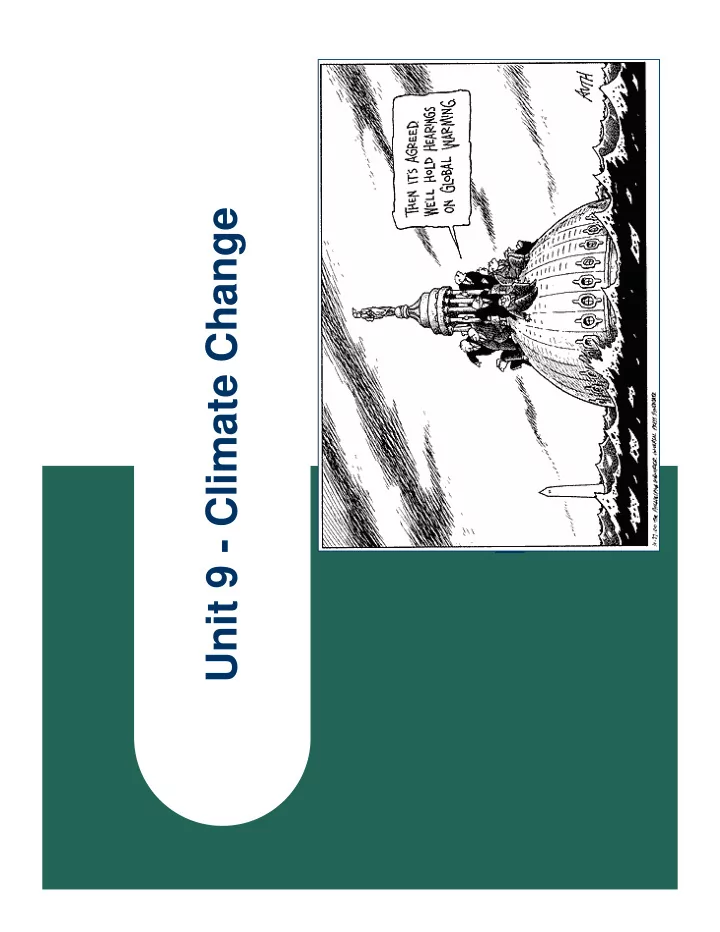

Unit 9 - Climate Change
Climate Change Consensus � Human activities have contributed to increased atmospheric concentrations of CO 2 by 36% from pre-industrial values of 280 ppm to 380 over the past 150 years. � Global temperatures have already risen .9 degrees F over the last 100 years. Projected to rise anywhere from 2.7 – 10.7 degrees over the next 100 years.
U.N. Framework on Climate Change � Came into force March 24, 1994. – U.S. is a signatory. � Committed signatories to a voluntary “non- binding aim” to reduce atmospheric concentrations of greenhouse gases with the goal of “preventing dangerous anthropogenic interference with Earth’s climate system.”
Kyoto Protocol � Contains legally binding reduction in emissions an average of 6 – 8 percent below 1990 levels in the years 2008 –2012. – U.S. would be required to reduce its total emissions an average of 7 percent � President Clinton signed the protocol in 1998, against Senate advice. Protocol was never submitted for ratification.
impact in Gulf meter rise in from a one- Potential sea level. Sea Level Rise
Texas Shore Sea Level Rise, con’t. Chesapeake Bay
Impacts of Sea Level Rise � Beach Erosion � Inundation of Low Lying Areas � Saltwater Intrusion into Aquifers � Increased Flooding.
Beach Erosion Over the next 60 years, erosion alone may claim one out of four houses within 500 feet of the U.S. shoreline without coastal engineering projects. (Heinz Center, 2000).
What can be done? � Four categories of public policy responses to sea level rise and erosion. – Maintain the status quo; – Pursue hard engineering (build dikes, seawalls, etc.); – Soft engineering (encourage retreat, use limited beach nourishment); and – Strategic relocation.
Cost of Holding Back the Sea � Estimated cost in the U.S. for a one-meter rise in sea level would be $270 – 475 billion. � Given high coastal property values, holding back the sea might be cost-effective. – Densely developed coastal lowlands could be protected for approximately $1,000 – 2,000 per year for a typical coastal lot.
Proposed Polar Bear ESA Listing � In January 2007, FWS issued a proposed rule to list the polar bear as threatened throughout its range under the Endangered Species Act. � 90-day comment period ended April 9. � January 2008 – deadline for final listing determination.
Basis for Listing Graphics courtesy of NASA FWS concluded that polar bear populations are threatened by ongoing and projected changes in their sea ice habitat due to climate change.
So What? ESA Listing Triggers: � Section 9’s prohibition against taking; � Protective regulations and recovery plans for the conservation and survival of the species; and � Federal agency must insure that its actions are not likely to jeopardize the continued existence of the species. Will listing force regulation of greenhouse gas emissions?
Other Climate Change Litigation � Clean Air Act Litigation � NEPA Litigation � Nuisance Litigation � Preemption Litigation � Information-forcing Litigation
Clean Air Act EPA shall prescribe “standards applicable to the emission of any air pollutant from any class or classes of new motor vehicles” which in its judgment cause or contribute to air pollution “which may reasonably be anticipated to endanger public health or welfare.”
Massachusetts v. EPA � In 1999, petition filed asking EPA to regulate motor vehicle emissions of greenhouse gases under CAA. � In 2003, EPA formally denied the petition. – CAA does not authorize EPA to issue mandatory regulations to address global climate change (contrary to previous GC opinions) and – Even if it did have the authority, it would be unwise to do so at this time.
Overview of Standing � Pursuant to Article III, federal courts may only hear actual “cases and controversies.” � Plaintiffs must prove: – Suffered a particularized injury; – Injury is traceable to defendant’s actions; and – Court has ability to award relief that will redress the plaintiff’s injury.
Supreme Court Ruling � Majority – Focused on Massachusetts, holding that state has a special interest. – Massachusetts owns a lot of territory which will be affected if sea levels rise. � Dissent – Loss of coastal land is not “imminent” and cannot be predicted with certainty.
Merits (5 – 4) � Does CAA authorize EPA to regulate emissions of greenhouse gases? YES! – CO 2 , methane, etc. are physical and chemical substances emitted into the air. � Can EPA decline to regulate based on policy judgments? NO! – Judgment must relate to whether pollutant contributes to air pollution which endangers public.
Does EPA have to Regulate CO 2 ? � NO!!! – Can make a judgment that it doesn’t endanger public welfare. � Such a decision, however, would almost certainly be challenged in court.
NEPA Litigation Allege that government agencies have failed to analyze or disclose information about the consequences of their projects or programs with implications for global warming.
Nuisance Litigation � Involves claims that public or private actions contributing to global warming represent a “nuisance” under common law tort doctrine. � A nuisance is: – An activity that arises from unreasonable, unwarranted, or unlawful use by a person of his own property which causes injury to another or the public.
Preemption Litigation � Claim that federal authority bars state from regulating greenhouse gas emissions. � State efforts to curb emissions from motor vehicles. – Trial in VT started in April.
Information-forcing Litigation � Based upon statutory requirements that compel government entities to generate, compile, and disclose information. – Statutes can require disclosure of existing information (FOIA). – Statutes can require government agencies to compile information.
Recommend
More recommend